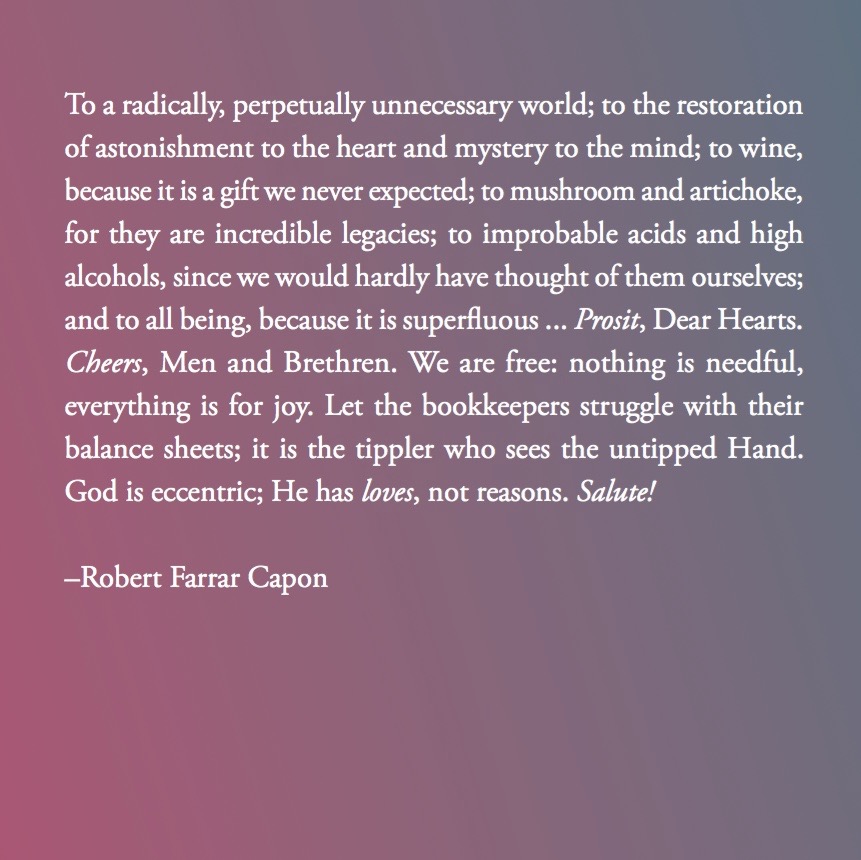

Ethan has joked elsewhere about our recent Food & Drink Issue: we had selected a topic that was intentionally “lighter fare” to chase Mental Health and then watched as the stuff that came in delved into the heaviest possible corners of gastronomic experience (pun sort of intended). Addiction, mortality, moralism, Marduk… sheesh. Good thing we had plenty of Capon on the menu to balance the palate and steer us clear of potential (food) comas. From what we’ve heard back thus far, the fun still comes across, thank God.
The point here is not to issue some vague humblebrag about #depth. No, if the intensity of those initial contributions signaled anything, it was just how much moral and spiritual weight food has come to carry. Laws around food, you might say, have long since permeated whatever boundary may exist between the “first use of the law” (where do’s and don’t’s exist for the sake of nutrition, taste, sustainability) and the second use (where the kitchen becomes a broker of identity, justification, redemption, immorality, etc).* They’ve obliterated it in fact.
I haven’t seen this spelled out more clearly than in the manifesto Michelle Allison produced for The Atlantic on diet culture and mortality (that Ethan mentioned on Friday). A few more paragraphs warrant reproduction:
The omnivore’s paradox was originally defined by psychological researcher Paul Rozin as the anxiety that arises from our desire to try new foods (neophilia) paired with our inherited fear of unknown foods (neophobia) that could turn out to be toxic. All omnivores feel these twin pressures, but none more acutely than humans. If it weren’t for the small chance of death lurking behind every food choice and every dietary ideology, choosing what to eat from a crowded marketplace wouldn’t be considered a dilemma. Instead, we would call it “the omnivore’s fun time at the supermarket,” and people wouldn’t repost so many Facebook memes about the necessity of drinking a gallon of water daily, or the magical properties of apple cider vinegar and coconut oil. Everyone would be just a little bit calmer about food…
Our omnivorousness gives us an exhilarating and terrifying amount of freedom. As social creatures, we seek safety from that freedom in our culture, and in a certain amount of conformity. We prefer to follow leaders we’ve invested with authority to blaze a path to safety. [ed. note: calling John Gray!]
The heroes of contemporary diet culture are wellness gurus who claim to have cured themselves of fatness, disease, and meaninglessness through the unimpeachable purity of cold-pressed vegetable juice…
Overwhelmed by choice, by the dim threat of mortality that lurks beneath any wrong choice, people crave rules from outside themselves, and successful heroes to guide them to safety. People willingly, happily, hand over their freedom in exchange for the bondage of a diet that forbids their most cherished foods, that forces them to rely on the unfamiliar, unpalatable, or inaccessible, all for the promise of relief from choice and the attendant responsibility. If you are free to choose, you can be blamed for anything that happens to you: weight gain, illness, aging—in short, your share in the human condition, including the random whims of luck and your own inescapable mortality.
Humans are the only animals aware of our mortality, and we all want to be the person whose death comes as a surprise rather than a pathetic inevitability. We want to be the one of whom people say, “But she did everything right.” If we cannot escape death, maybe we can find a way to be declared innocent and undeserving of it.
There is no certain path to purity and blamelessness through food. The only common thread between competing dietary ideologies is the belief that by adhering to them, one can escape the human condition, and become a purer, less animal, kind of being.
This is why arguments about diet get so vicious, so quickly. You are not merely disputing facts, you are pitting your wild gamble to avoid death against someone else’s. You are poking at their life raft. But if their diet proves to be the One True Diet, yours must not be. If they are right, you are wrong. This is why diet culture seems so religious. People adhere to a dietary faith in the hope they will be saved. That if they’re good enough, pure enough in their eating, they can keep illness and mortality at bay. And the pursuit of life everlasting always requires a leap of faith.
Wow. She’s 100% of course. It’s hard to imagine what food(ie) culture would look like without the purity/righteousness component that’s so often hidden beneath the epicurean garnish. In this sense, food has indeed become one of our favorite religions–both a liturgy and self-salvation schema. At least, if your definition of “religion” is a religion of law–which seems to be the default for our ladder-climbing/freedom-averse species. (Sigh).
Alas, to paraphrase RFC, this particular emperor not only doesn’t have clothes on, he isn’t even there. This is why Capon is so focused on food/eating as pleasure, a good gift rather than a sublimated currency. I’m fairly certain we all know this on some level. Which may or may not prompt some of us to eat to anesthecize our hearts.
Fortunately, the article doesn’t end there. Allison boldly (if briefly) outlines what we might call a more ‘grace-based’ approach to diet. One that doesn’t look to food to be anything more than what it is. In a beautiful irony, she calls it “agnostic eating”:
To eat without restriction, on the other hand, is to risk being unclean, and to beat your own uncertain path. It is admitting your mortality, your limitations and messiness as a biological creature, while accepting the freedoms and pleasures of eating.
Amen to that. Or should I say, bon appetit. Over to you, Robert:

* I’m less and less convinced there is one, strictly speaking.

COMMENTS
Leave a Reply












